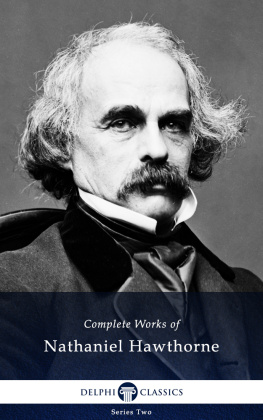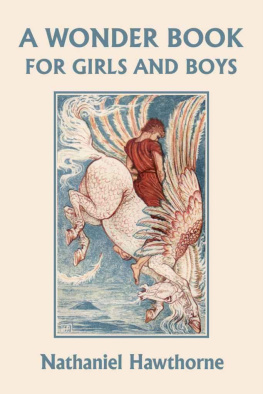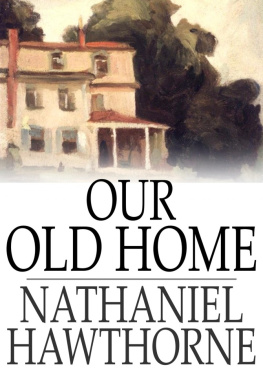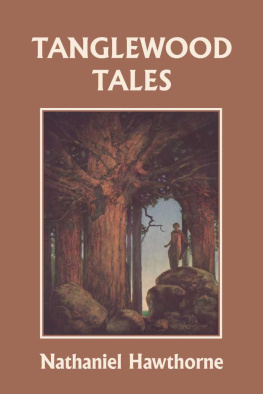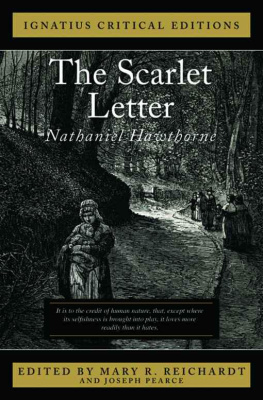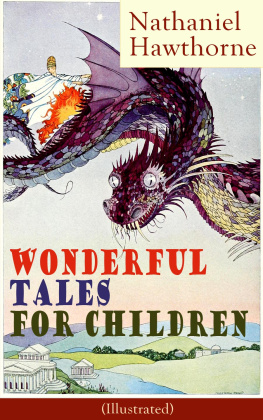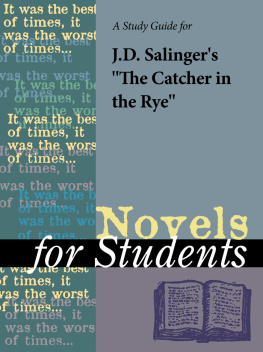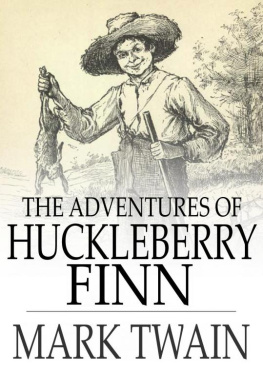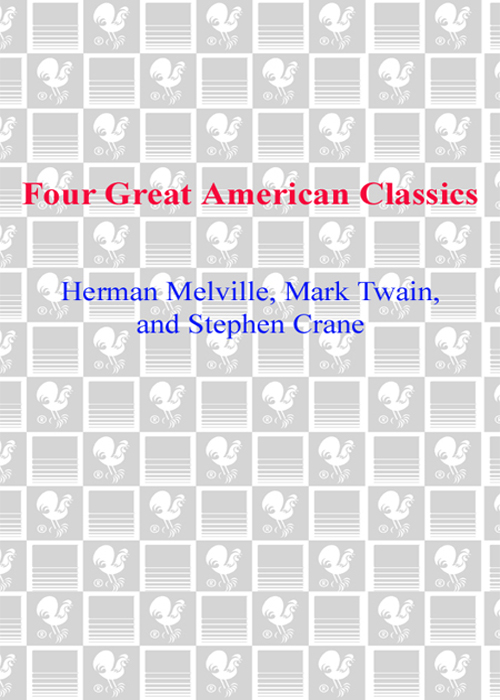
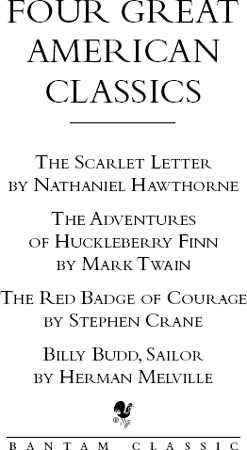
CONTENTS
FOUR CLASSIC NOVELS BY FOUR OF AMERICAS GREATEST AUTHORS
The Scarlet Letter, The Adventures of Huckleberry Finn, The Red Badge of Courage, and Billy Budd, Sailor, were all written in the fifty years between 1850 and the turn of the century. Each novel stresses a different handling of the genre, each takes a different approach to content, character, and style, yet each produces a masterpiece that touches universal human experienceand in a uniquely American way. From Nathaniel Hawthornes self-proclaimed romance of sensuality and sin to the contemporary naturalism of Stephen Cranes great war novel, these four great American classics are literature of unsurpassed excellence, each a unique revelation of a facet of Americas complex national character.
THE SCARLET LETTER

BY NATHANIEL HAWTHORNE
AUTHORS PREFACE TO THE SECOND EDITION
Much to the authors surprise, and (if he may say so without additional offence) considerably to his amusement, he finds that his sketch of official life, introductory to THE SCARLET LETTER, has created an unprecedented excitement in the respectable community immediately around him. It could hardly have been more violent, indeed, had he burned down the Custom House, and quenched its last smoking ember in the blood of a certain venerable personage, against whom he is supposed to cherish a peculiar malevolence. As the public disapprobation would weigh very heavily on him, were he conscious of deserving it, the author begs leave to say that he has carefully read over the introductory pages, with a purpose to alter or expunge whatever might be found amiss, and to make the best reparation in his power for the atrocities of which he has been adjudged guilty. But it appears to him, that the only remarkable features of the sketch are its frank and genuine good-humor, and the general accuracy with which he has conveyed his sincere impressions of the characters therein described. As to enmity, or ill-feeling of any kind, personal or political, he utterly disclaims such motives. The sketch might, perhaps, have been wholy omitted, without loss to the public, or detriment to the book; but, having undertaken to write it, he conceives that it could not have been done in a better or a kindlier spirit, nor, so far as his abilities availed, with a livelier effect of truth.
The author is constrained, therefore, to republish his introductory sketch without the change of a word.
Salem. March 30, 1850.
THE CUSTOM HOUSE

INTRODUCTORY
I T IS a little remarkable, thatthough disinclined to talk overmuch of myself and my affairs at the fireside, and to my personal friendsan autobiographical impulse should twice in my life have taken possession of me, in addressing the public. The first time was three or four years since, when I favored the readerinexcusably, and for no earthly reason that either the indulgent reader or the intrusive author could imaginewith a description of my way of life in the deep quietude of an Old Manse. was never more faithfully followed. The truth seems to be, however, that, when he casts his leaves forth upon the wind, the author addresses, not the many who will fling aside his volume, or never take it up, but the few who will understand him, better than most of his schoolmates or lifemates. Some authors, indeed, do far more than this, and indulge themselves in such confidential depths of revelation as could fittingly be addressed, only and exclusively, to the one heart and mind of perfect sympathy; as if the printed book, thrown at large on the wide world, were certain to find out the divided segment of the writers own nature, and complete his circle of existence by bringing him into communion with it. It is scarcely decorous, however, to speak all, even where we speak impersonally. But, as thoughts are frozen and utterance benumbed, unless the speaker stand in some true relation with his audience, it may be pardonable to imagine that a friend, a kind and apprehensive, though not the closest friend, is listening to our talk; and then, a native reserve being thawed by this genial consciousness, we may prate of the circumstances that lie around us, and even of ourself, but still keep the inmost Me behind its veil. To this extent, and within these limits, an author, methinks, may be autobiographical, without violating either the readers rights or his own.
It will be seen likewise, that this Custom House sketch has a certain propriety, of a kind always recognized in literature, as explaining how a large portion of the following pages came into my possession, and as offering proofs of the authenticity of a narrative therein contained. This, in fact,a desire to put myself in my true position as editor, or very little more, of the most prolix among the tales that make up my volume,this, and no other is my true reason for assuming a personal relation with the public. In accomplishing the main purpose, it has appeared allowable, by a few extra touches, to give a faint representation of a mode of life not heretofore described, together with some of the characters that move in it, among whom the author happened to make one.
In my native town of Salem, at the head of what, half a century ago, in the days of old King Derby, was a bustling wharf,but which is now burdened with decayed wooden warehouses, and exhibits few or no symptoms of commercial life, except, perhaps, a bark or brig, half-way down its melancholy length, discharging hides; or, nearer at hand, a Nova Scotia schooner, pitching out her cargo of firewood,at the head, I say, of this dilapidated wharf, which the tide often overflows, and along which, at the base and in the rear of the row of buildings, the track of many languid years is seen in a border of unthrifty grass,here, with a view from its front windows adown this not very enlivening prospect, and thence across the harbor, stands a spacious edifice of brick. From the loftiest point of its roof, during precisely three and a half hours of each forenoon, floats or droops, in breeze or calm, the banner of the republic; but with the thirteen stripes turned vertically, instead of horizontally, and thus indicating that a civil, and not a military post of Uncle Sams government is here established. Its front is ornamented with a portico of half a dozen wooden pillars, supporting a balcony, beneath which a flight of wide granite steps descends towards the street. Over the entrance hovers an enormous specimen of the American eagle, with outspread wings, a shield before her breast, and, if I recollect aright, a bunch of intermingled thunderbolts and barbed arrows in each claw. With the customary infirmity of temper that characterizes this unhappy fowl, she appears, by the fierceness of her beak and eye, and the general truculency of her attitude, to threaten mischief to the inoffensive community; and especially to warn all citizens, careful of their safety, against intruding on the premises which she overshadows with her wings. Nevertheless, vixenly as she looks, many people are seeking, at this very moment, to shelter themselves under the wing of the federal eagle; imagining, I presume, that her bosom has all the softness and snugness of an eiderdown pillow. But she has no great tenderness, even in her best of moods, and, sooner or later,oftener soon that late,is apt to fling off her nestlings, with a scratch of her claw, a dab of her beak, or a rankling wound from her barbed arrows.
Next page

